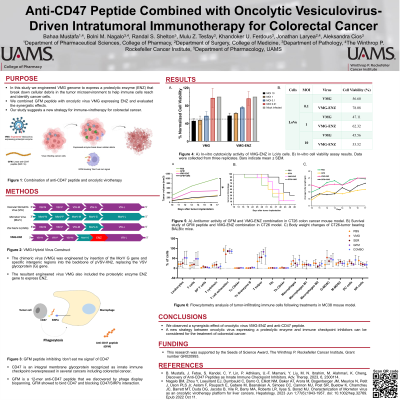Pharmaceutics
(283) Anti-CD47 Peptide Combined with Oncolytic Vesiculovirus-Driven Intratumoral Immunotherapy for Colorectal Cancer


Bahaa Mustafa, PhD (he/him/his)
Assistant Professor
University of Arkansas for Medical Sciences
Little Rock, Arkansas, United States
Primary Author(s)
Objective : Study the antitumor activity of a combination of oncolytic virus VMG and anti-CD47 peptide for the treatment of colorectal cancer.
Methods: In this study, we engineered the VMG genome to express a proteolytic enzyme (ENZ) that breaks down cellular debris in the tumor microenvironment to help immune cells reach and identify cancer cells. We combined VMG-ENZ virus with a 12-mer anti-CD47 peptide that was shown to extend the survival of CT26-tumor-bearing mice and delay the CT26 tumor growth.
Results: Our results showed that the combination enhanced the antitumor activity and increased the survival of CT26 tumor-bearing mice. Our study suggests a new strategy for immune-virotherapy for colorectal cancer. In addition, we used MTS cell viability assay at 72 hours post-infection, and we did not observe a significant reduction in the infectivity of the VMG-ENZ at multiplicities of infection (MOI) of 0.01, 0.1, 1, and 10.
Conclusions: Despite immune checkpoint inhibitors revolutionizing the cancer therapy field, it is largely ineffective in some patients. To address this limitation, oncolytic viruses in combination with anti-CD47 peptide can be a strategy to address the inefficacy of immune checkpoint inhibitors. We observed a synergistic effect of oncolytic virus VMG-ENZ and GFM peptide. VMG-ENZ virus expressing ENZ, a proteolytic enzyme that helps in the degradation of extracellular matrix in the tumor microenvironment. A new strategy between oncolytic virus expressing a proteolytic enzyme and immune checkpoint inhibitors can be considered for the treatment of colorectal cancer.
Methods: In this study, we engineered the VMG genome to express a proteolytic enzyme (ENZ) that breaks down cellular debris in the tumor microenvironment to help immune cells reach and identify cancer cells. We combined VMG-ENZ virus with a 12-mer anti-CD47 peptide that was shown to extend the survival of CT26-tumor-bearing mice and delay the CT26 tumor growth.
Results: Our results showed that the combination enhanced the antitumor activity and increased the survival of CT26 tumor-bearing mice. Our study suggests a new strategy for immune-virotherapy for colorectal cancer. In addition, we used MTS cell viability assay at 72 hours post-infection, and we did not observe a significant reduction in the infectivity of the VMG-ENZ at multiplicities of infection (MOI) of 0.01, 0.1, 1, and 10.
Conclusions: Despite immune checkpoint inhibitors revolutionizing the cancer therapy field, it is largely ineffective in some patients. To address this limitation, oncolytic viruses in combination with anti-CD47 peptide can be a strategy to address the inefficacy of immune checkpoint inhibitors. We observed a synergistic effect of oncolytic virus VMG-ENZ and GFM peptide. VMG-ENZ virus expressing ENZ, a proteolytic enzyme that helps in the degradation of extracellular matrix in the tumor microenvironment. A new strategy between oncolytic virus expressing a proteolytic enzyme and immune checkpoint inhibitors can be considered for the treatment of colorectal cancer.

.png)